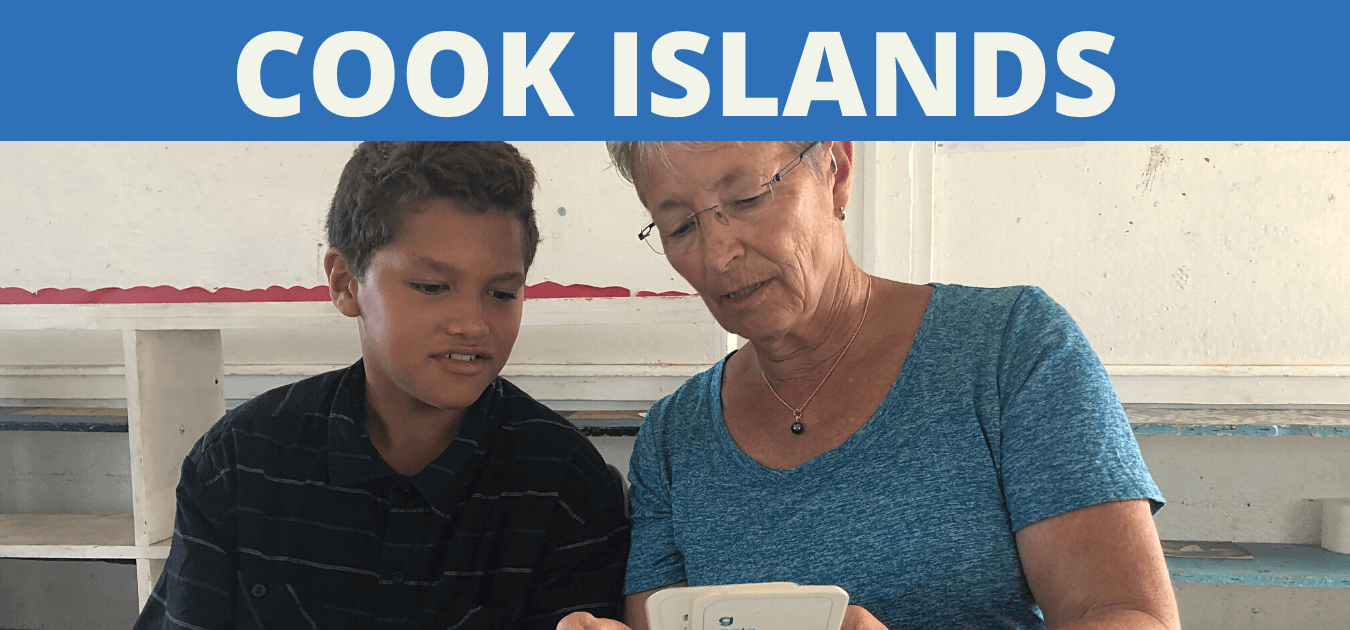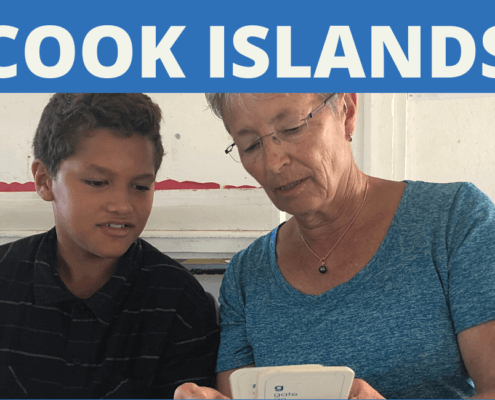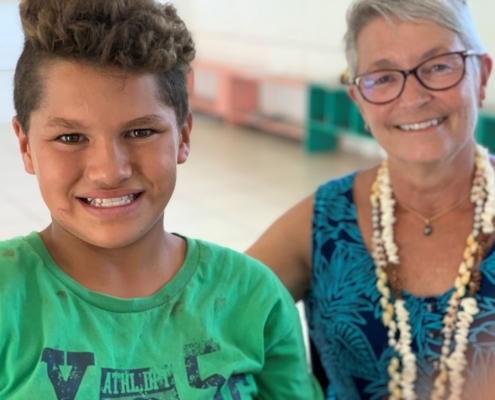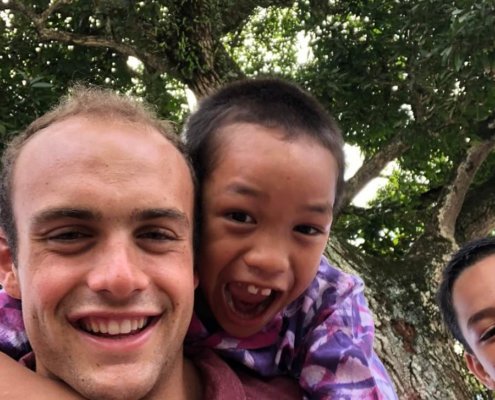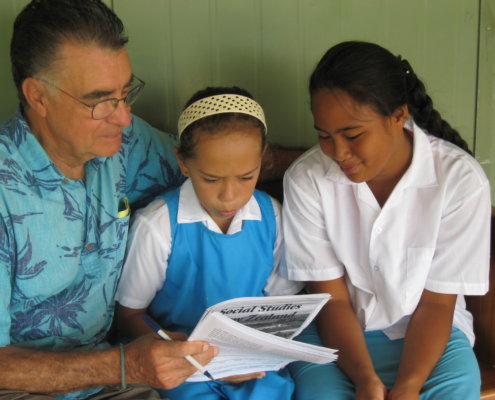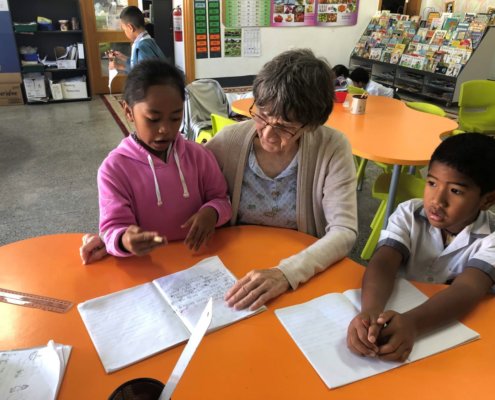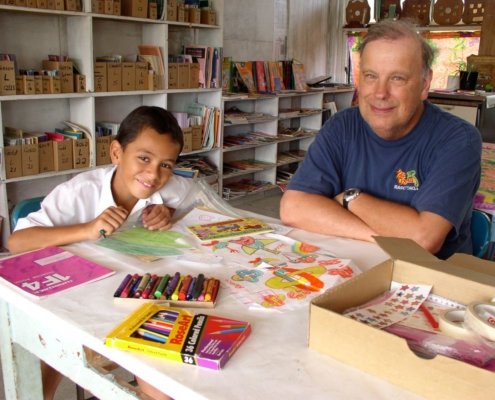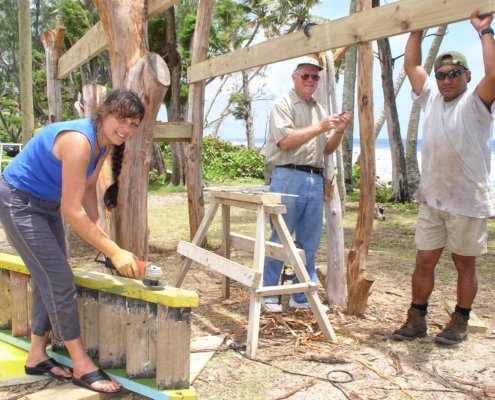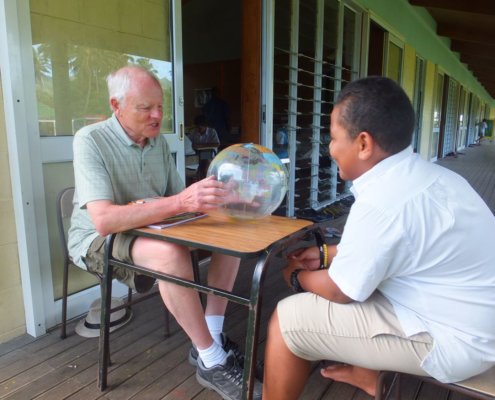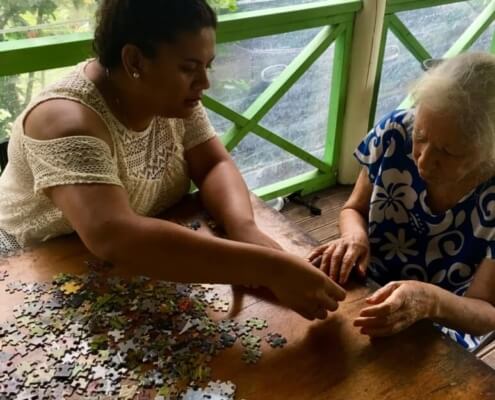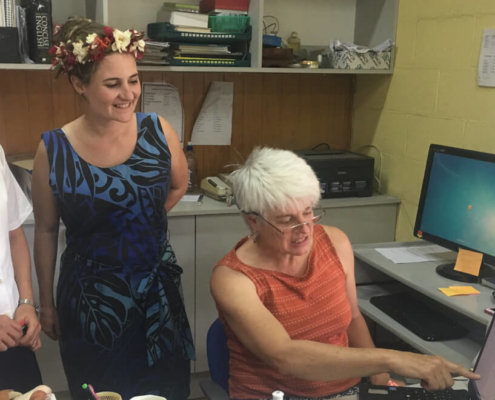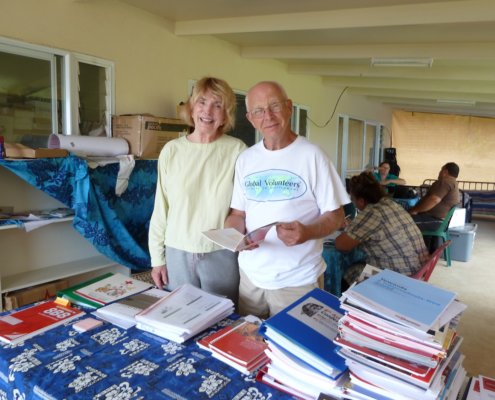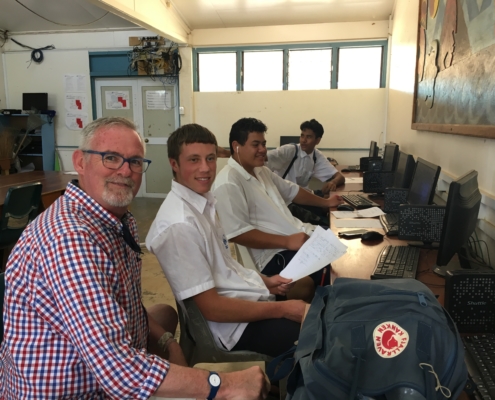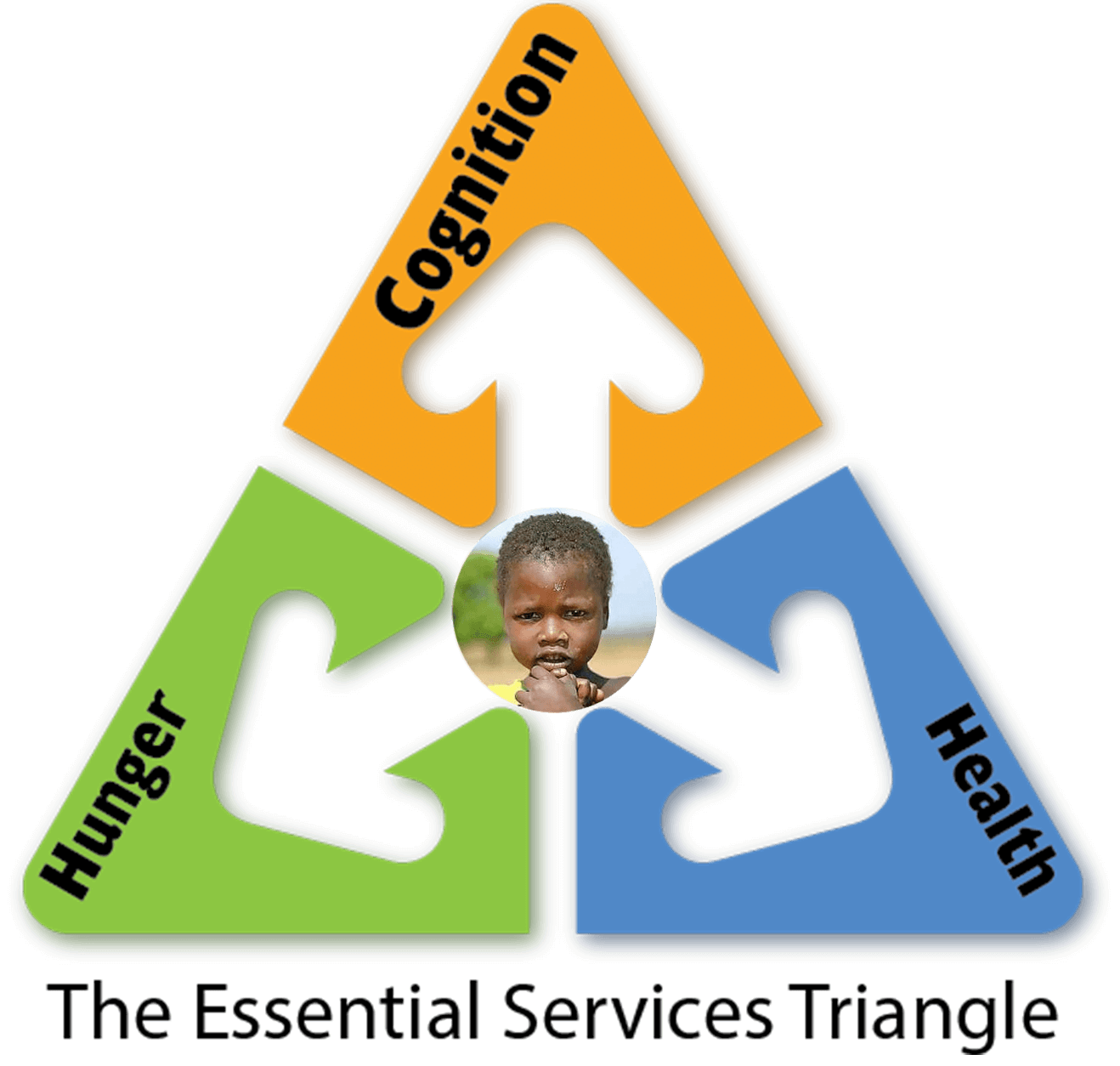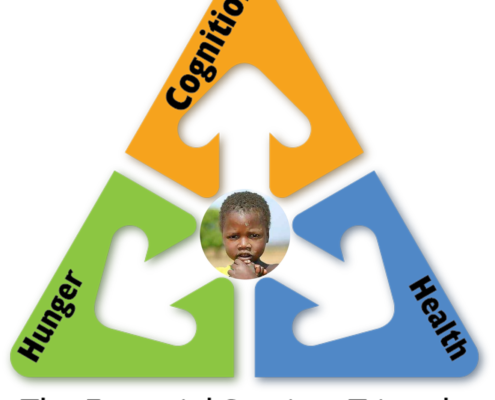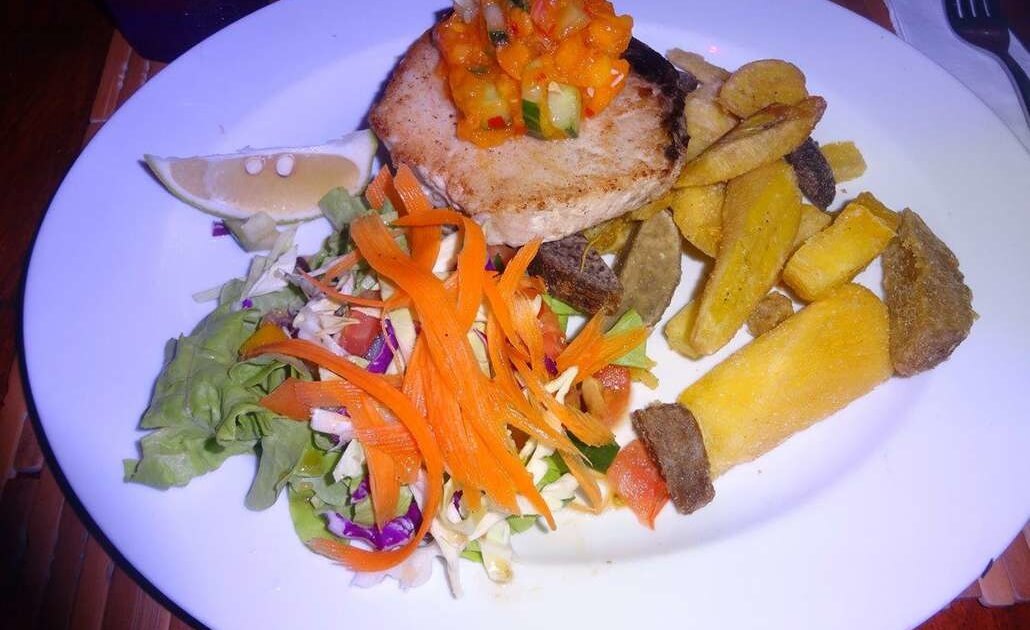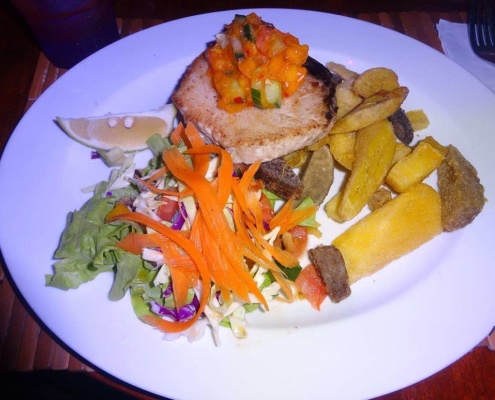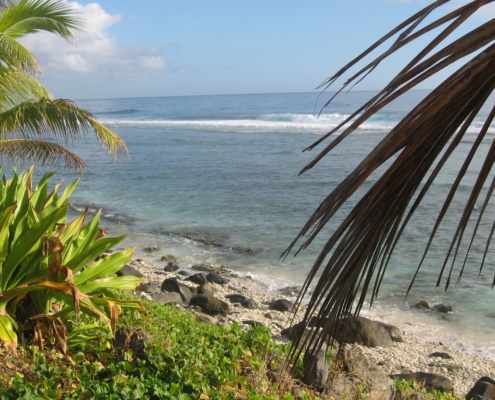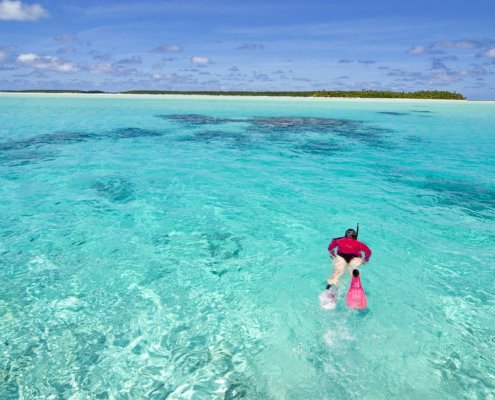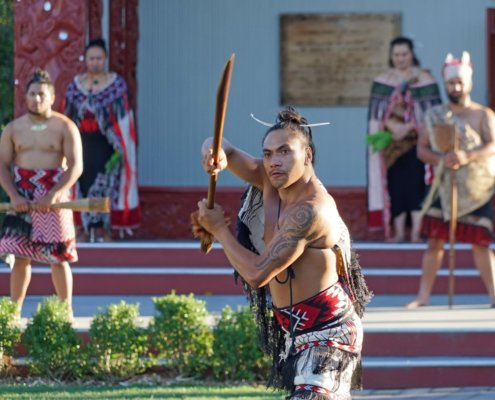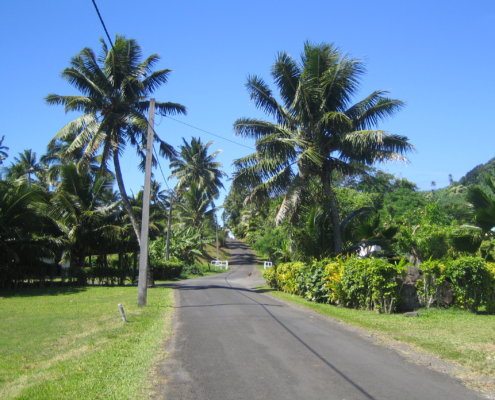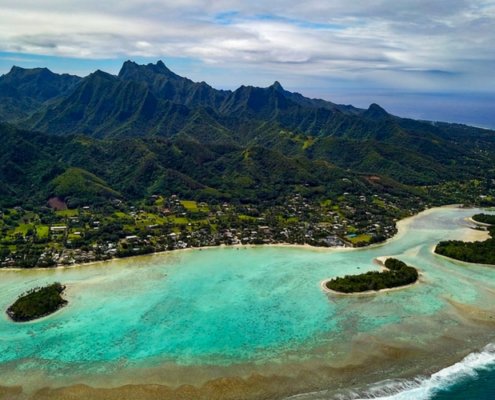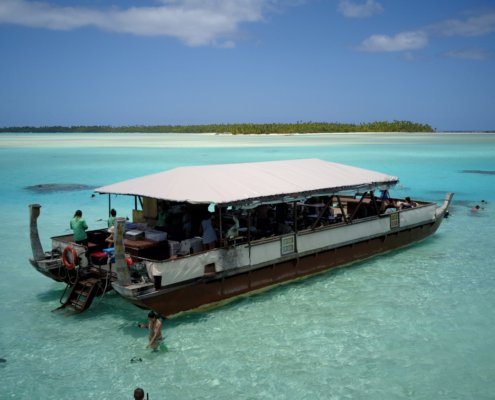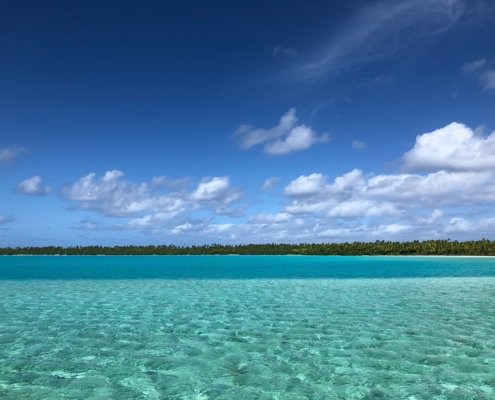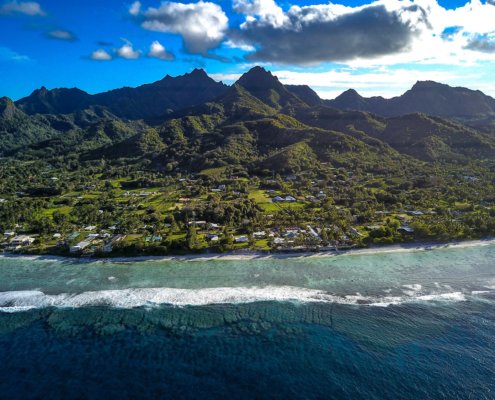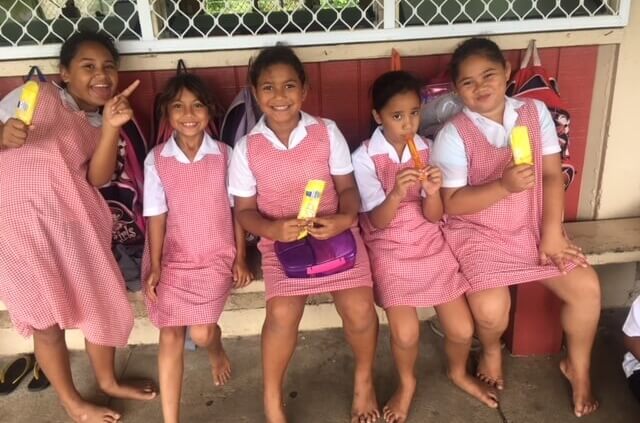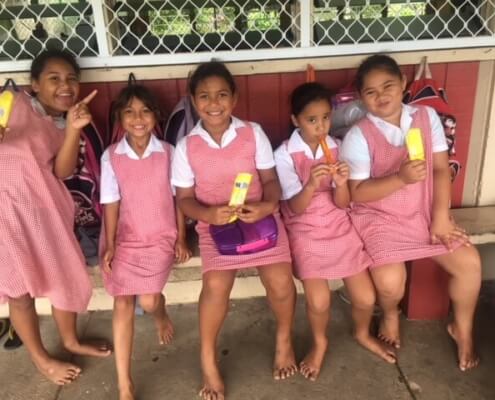Serving in the Cook Islands
The Cook Islands – a place where barefoot children arrive at school with toothy smiles dominating their faces; a place where shoes are unimportant, but happiness is.
High truancy rates and emphasis on chores over homework play a part in many children lagging behind in their education. Cook Islands children are generally educated in two very different languages (Cook Islands Maori and English). There is also a tradition of oral culture, so reading is not a common hobby with few homes having books for children to read. These factors contribute to difficulties with reading and comprehension and this is where you can help by providing that one-on-one attention the students need.
Cook Islands leaders say that to ensure children’s continued happiness and development, they must supply significant outside assistance to strengthen their educational foundation – and provide opportunities for those educated children to earn a lifelong living within their nation. Over years of close partnership with our island friends, Global Volunteers has been helping provide essential services – engaging volunteers’ unique skills in the areas of literacy, public health, and specialized care.
How You Can Help
- Make learning fun through reading games, skits, music – there’s no limit!
- Provide one-on-one attention to children with special education needs.
- Inspire young adults to develop life skills by offering personal lessons or case studies.
- Serve as a classroom resource by simply sharing your personal knowledge.
- Encourage and support islanders of all ages living with disabilities.
- Invest in island conservation projects.
The current government is seeking to minimize the “brain drain” from the islands over two decades, and to encourage people to return by improving educational, cultural, medical, and environmental services in the Cook Islands. We are committed to helping them.
We hope you will seize this unique opportunity to be of genuine service to the people of the Cook Islands while enjoying their beautiful tropical home. As a volunteer instead of a tourist, you will get to know and learn from the Cook Islanders and you will leave behind the gifts of hope, service, and friendship – impressions that will last far longer than footprints in the sand.
Community Partner & Work Projects
Global Volunteers has been invited by the Cook Islands Civil Society Organization (CICSO) to lend a hand in a variety of ways. This organization is led by an elected president, currently Clee Marsters, the son of Tom John Marsters, King Charles III Representative (KR) in the Cook Islands. The role of this organization is to represent the needs and desires of all of the non-governmental organizations in the Cook Islands. They facilitate support and voice the concerns of community organizations throughout the Cook Islands. CICSO is, therefore, advocating for change in the country and trying to have government and outside agencies help meet the needs of the people living in the Cook Islands.
The following is a description of some of the available service projects.
Reading and literacy: The priority project, as requested by our hosts in the Cook Islands, is literacy. Volunteers are needed to tutor students in reading from the elementary to high school level. Because the Cook Islands honor their strong oral Maori tradition, some students do not formally learn English until the 4th grade. Once in 4th grade, the emphasis switches to English. Students often struggle with phonetics, comprehension, and reading. Teachers, parents, employers, and the students themselves have identified tutoring in reading as vital to advancement in high school and later in the workforce. Elementary schools must put every child through a reading program in the regular curriculum. Volunteers are needed to fill in the gap, especially for students with learning disabilities or students who are simply struggling and need extra help. Once the students reach high school, there is no reading program, so without volunteers, they do not get any further tutoring; however, you may be asked to help students who are still struggling with English writing and reading. Depending on the school, volunteers can spend anywhere from five minutes to an hour tutoring an individual student or small groups of students.
Tutoring Numeracy: One-on-one and group assistance is needed in numeracy and math comprehension and mastery. Anyone with math skills can be of tremendous value. The school year begins in late January and ends in early December. The high school needs volunteers to help with baseline testing at the beginning of each year and progress testing at the end of the final term. Volunteers with an academic background can be especially helpful in meeting this important need.
Early Childhood Education: Local people understand the long-term benefits of enrolling their children in preschools, and there are several on the island. Volunteers work with children from three to five years old in a variety of early childhood learning activities including reading to the children, playing with age appropriate toys, nurturing children, teaching handwashing with soap and water, offering a global perspective, and engaging in arts and crafts.
Baby Health Examinations: Cook Islands Child Welfare Association (CICWA) works with parents and caregivers, so they feel encouraged to nurture and care for their children to reach their full potential. CICWA runs clinics in local villages, and the Ministry of Health’s Public Health Nurses do the infant examinations at those clinics. However, due to a lack of staff in the Ministry of Health, nurses often arrive either late or not at all. Volunteers with a background in nursing, especially in the field of children’s health, ears, eyes, throat, skin, and bones, will be of great help to CICWA by helping them conduct baby health examinations and organizing parent/child evening workshops.
Repair and Maintenance: The Cook Islands enticing allure and majestic beauty are in large part due to the spectacular views of the crystal blue water of the South Pacific and the clear sunny skies. But the ocean salt and the sun’s energy take a tremendous toll on all kinds of structures – classrooms, playgrounds, fences. Volunteers help protect and maintain school facilities by painting, repairing, and reconstructing buildings, and meeting plumbing, carpentry, and electrical needs.
Environment and Conservation: Established in 1996, Takitumu Conservation Area area provides safe breeding ground for the endangered Rarotongan fly-catcher or kakerori. Global Volunteers assist local staff to repair existing trails, blaze new trails, clear fallen trees, and do light construction. At certain times of the year you may assist with a bird census or rat baiting activities. Because this project involves strenuous labor in rough terrain and often the use of a machete, it inherently poses far greater safety risks than any other project in the Cook Islands. This project requires high levels of mobility and fitness. This intermittent project depends on community personnel available to work alongside volunteers.
Administration and Finance: Both the Cook Islands Civil Society Organizations (CICSO) members and several schools need assistance in a variety of administrative functions, including drafting organizational constitutions (by laws) and funding proposals (there is money available from international organizations to help schools and NGOs in developing countries, but the proposal process requires expertise that is not widely available on the island). Accounting and bookkeeping are other skill areas where volunteers help set up sustainable systems and teach local people how to effectively use those systems.
The Essential Services
At the center of community development is Global Volunteer’s Essential Services Triangle. These are the 12 essential services, prescribed by the United Nations, which every child needs to realize the fullness of their potential. Global Volunteers organizes these services into three major categories – Eradicating Hunger, Improving Health, and Enhancing Cognition.
HUNGER
- School and household gardens
- Child nutrition
- Micronutrient supplementation
- Improved stoves
HEALTH
- Health, nutrition, and hygiene education
- Malaria and dengue fever prevention
- Deworming
- HIV/AIDS education
COGNITION
- General education
- Promoting girls’ education
- Potable water and sanitation facilities
- Psychosocial support
Global Volunteers is committed to supporting our community partners in these 12 areas through the sustained, comprehensive assistance of an ongoing stream of short-term volunteers and direct project donations from volunteers and supporters worldwide. Our focus is on pregnant women and their children. Depending upon the needs of the host community and the community-based projects requested by local people, Global Volunteers helps deliver some or all of the 12 services. Every volunteer can help in one or more of these 12 interventions. As a short-term volunteer, you’re a vital component in helping families and local community organizations deliver these essential services to their children.
Service Program Logistics
Global Volunteers Cook Islands Team Leader, Samantha (Sam) Puati-Ellison, leads all teams in the Cook Islands. In cooperation with our community partners, Sam will facilitate your team’s orientation, assist you in being fully engaged in your assigned work project(s), and manage all project-related logistical issues. As Cook Islander, Sam will introduce you to the community, help acclimate you to the local culture, invite you to community events, and engage you in the day-to-day life of the community.
Meals
Three meals a day are included in your service program fee. Each morning, you will eat a catered a continental breakfast in the Vaka Lounge, the Global Volunteers meeting room at the hotel. You will prepare your own lunch to take to your work site; this will likely be a sandwich with fruit and snacks such as a granola bar. Dinner will also be taken in the Vaka Lounge and will be prepared by a local cook trained in safe food handling to prepare typical, nutritious, home-cooked Cook Islands cuisine. Volunteers can expect to dine out at least once or twice a week. The evening meal usually consists of a range of beef, chicken, or fish dishes served with salads and either pasta or rice along with bread and a variety of local fruit for dessert. You will have the opportunity to try local traditional dishes such as taro (a root crop similar to a potato), ika mata (fish marinated in lemon juice and topped off with a coconut cream sauce), rukau (a spinach and coconut cream dish), and other delicacies which are usually very well received! Desserts, soft drinks, and alcoholic beverages are readily available for an additional charge.
Lodging
Kiikii Inn & Suites offers a perfect blend of comfort, tranquility, and authentic island hospitality. Your secure family-owned hotel, near Avarua features seaside rooms with a private bathroom, a flat-screen TV, and in-room coffee and tea. Fall asleep to the rhythm of waves crashing the shore outside your door. Surrounded by lush tropical gardens and overlooking the breathtaking turquoise waters of the South Pacific, Kiikii Inn & Suites provides an enchanting escape. Kiikii Inn & Suites is thoughtfully designed with modern amenities and traditional Polynesian touches, ensuring a comfortable and immersive experience. Steps away, the hotel pool is surrounded by a lovely garden area, and swaying palm trees.
Transportation
All in-country transportation is included in your service program fee. You will be picked up at the airport on the first day of your program by our country manager in our 15-person van with adequate space for luggage and dropped off on the final day of your program. On orientation day, your team leader will give you important information on your service projects and on the first day of service will take you to the work project sites. The local public bus or the school bus will be your transportation to and from your work sites each day thereafter. Depending on the work site, travel time varies from five to 30 minutes. Note: transportation for free time activities is not included.
Program Mobility
Accurately assess your functional mobility. Our work assignments and partner communities require varying levels of physical stamina and mobility. After you register, you will be asked about your physical capabilities relating to your mobility. Please answer the questions honestly.
Required Mobility for Cook Islands: Mobile – Walk 1 mile, climb five flights of stairs, walk on uneven terrain, and get on and off buses and trains independently.
Free-Time Activities
Free-time options are plentiful in the Cook Islands. They include snorkeling in the clear lagoons, scuba diving (if you are certified), fishing, or hiking the rugged and lush interior island. The Punanganui Market is open on Saturday mornings and is the largest local market in Rarotonga. Here you can expect to see cultural performances as well as what is sold – local produce, fish, and crafts. Volunteers also can enjoy flying to the outer island of Aitutaki for a weekend excursion or day trip. Of course, you may simply choose to relax on a quiet beach or linger at a local restaurant to catch one of the popular island dance shows. Those you have been working alongside may invite you to participate in local events with them or give you advice on local goings on. You also may have the opportunity to listen to talks given by local experts on topics such as pearls, coconuts, or whale conservation.
Service Program Contribution
Global Volunteers’ service program contribution covers all lodging in double accommodation, three meals a day, in-country team transportation, emergency medical evacuation insurance, all preparatory materials, onsite orientation, a full-time team leader, and administration costs. Single rooms are available for an additional fee. The Cook Islands service program fee is $2,897 for one week, $3,444 for two weeks, and $3,992 for three weeks. Please ask your volunteer coordinator about extended stay options and referral credits, as well as discounts for students, companions, alumni, and children under the age of 12 with an accompanying adult. Through Global Volunteers’ online fundraising tool you can create a personalized webpage to request partially tax-deductible donations from family and friends. Airfare and free time activity expenses are your responsibility. The service program contribution and airfare are tax-deductible for U.S. taxpayers.
Reserve your spot today. Call one of our volunteer coordinators at 800-487-1074 to register.
You CAN make a world of difference!
